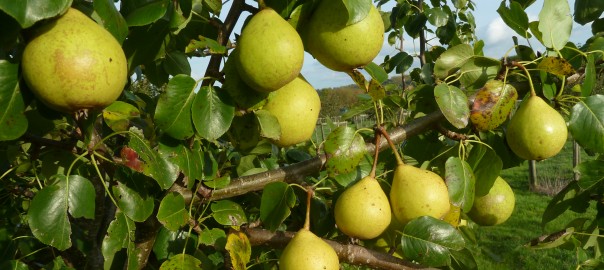| Variety | Description | Rootstock |
| Arlingham Squash | Perry Pear from Arlingham | Pyrus Communis |
| Bird Pear | Perry pear also from Arlingham | Pyrus Communis |
| Birdwood Huffcap | Perry Pear | Pyrus Communis |
| Beetroot Pears | This year I have grown all three ‘Beetroot Pears’ from Wick Court, Arlingham. ‘Alex’ ‘Ella’ and ‘Eric’ | Pyrus Communis |
| Black Worcester | It is thought it may have come to the UK by the Romans and was first mentioned at the Cistercian built Abbey of Warden in Bedfordshire in the 13th century. It may also be linked to the French pear ‘de Livre’. ‘Black Worcester’ was recorded as being grown by monks at the Abbey as early as 1388. As a long keeping fruit, it formed an important part of the winter diet until root-crops were introduced. The fruit is larger than average and the flesh hard and coarse, but is excellent when stewed. It may also have been used to make perry. | Pyrus Communis |
| Blood Pear | General purpose, red fleshed variety | Pyrus Communis |
| Concorde | Large yellow fruit with a pale yellow flesh, that is sweet and juicy. Very heavy cropper and a compact grower, ideal for pollinating Doyenne du Comice. Self-fertile. | Quince A, |
| Conference | Reliable cropper, excellent flavour, self-fertile, Hertfordshire 19th Century. | Quince A, Pyrus Communis |
| Dead Boy | Rare perry variety found on the Gloucestershire/Herefordshire border. Possibly gets it’s name from the strength of it’s perry!? | Pyrus Communis |
| Doyenne du Comice | Medium/large yellow fruit often with a red flush, rich juicy flavour, grow with Concorde for reliable pollination, 19th century. | Quince A, Pyrus Communis |
| Ducks Barn | A once widespread perry variety in Gloucestershire, that is now rare. | Pyrus Communis |
| Early Blunt Red | An early perry pear that may have been used to make quick fermenting sparkling perry, ready for Christmas. | Pyrus Communis |
| Gorham | Small to medium sized fruit. Very variable conical to pyriform shape. Greenish yellow skin with variable amounts of fine brown russetting. Creamy white, juicy, smooth textured flesh. Sweet with a musky flavour. A good dessert variety but also useful for cooking. | Pyrus Communis |
| Gin | High quality vintage perry pear | Pyrus Communis |
| Green Olive | General purpose variety. Only known mature trees are in Ashleworth. | Pyrus Communis |
| Greggs Pit | A property named Greggs Pit is an old cider and perrymaking small holding in Much Marcle. It’s orchards contain mature and younger trees of this variety | Pyrus Communis |
| Gummer | Perry pear | Pyrus Communis |
| Hillend Green | Perry Pear | Pyrus Communis |
| Knapper | Perry Pear | Pyrus Communis |
| Merton Pride | Dessert pear | Pyrus Communis |
| Monmouth Red | Perry Pear | Pyrus Communis |
| Painted Lady | Dessert | Pyrus Communis |
| Pine | Perry Pear | Pyrus Communis |
| Pint | Perry Pear | Pyrus Communis |
| Poire de Cloche | Very rare French pear | Pyrus Communis |
| Thurston’s Red | Also known as Dymock Red Pear | Pyrus Communis |
| Williams | Known world wide as “Bartlett” this variety provides regular crops of sweet and juicy fruit, Berkshire 18th Century. | Quince A, Pyrus Communis |
Prices:
Maidens = £22.00
Half Standard/Straightlead = £30.00
Root Stocks:
Quince A = semi vigorous
Pyrus Communis = Vigorous
